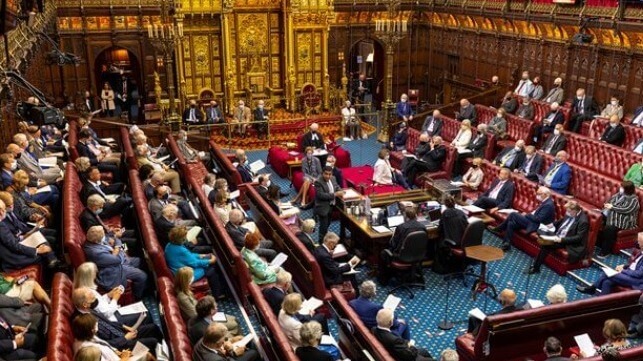The UK House of Lords Takes a Lead on Human Rights at Sea

The United Kingdom’s Upper House of Parliament, the House of Lords, has been driving policy change through greater awareness and accountability of the scale and scope of abuses at sea requiring intervention, as well as associated legal and policy development at state level.
The historic first debate in the UK Parliament on the issue of human rights at sea occurred on June 22, 2021, with a question put to the House by Lord Robin Teverson around the scope of what the Government understood by the term ‘human rights at sea’ and associated human rights protections.
In doing so, it triggered the initial framing of the issue and placed it on the Parliamentary agenda.
In November 2021, the House of Lords International Relations and Defence Select Committee took oral and written evidence from global experts in a formal inquiry examining the applicability of the UN Convention on the Law of the Sea (UNCLOS) as a framework convention in the 21st century. It asked, amongst other questions, how to address the contemporary challenge of monitoring and enforcing human rights law at sea.
The resulting report was issued in March 2022, and it highlighted that the Government “was falling short” in several policy and legislative areas. It also contained extensive Parliamentary Inquiry recommendations around the issue of human rights at sea with a dedicated ‘Chapter 5: Human Rights and Labour Protections at Sea’ devoted to requesting clarity on multiple areas of related concern. Key issues included: “the extensive use of ‘flags of convenience’ (states with limited domestic regulation, enforcement capacity and few criteria for registration) which has led to a ‘jurisdictional vacuum’ on the high seas.”
During evidence, expert witness Professor Anna Petrig (University of Basel) highlighted that “not only has the law of the sea been in large part human rights blind, but human rights law has until very recently suffered from serious sea blindness. As a result, human rights treaties that have been refined through many efforts by many actors are mainly for a land context and not for the sea.”
Crucially, the March report stated in paragraph 191: “We ask that in its response to this report, the Government confirms that it considers international human rights law to apply equally at sea as it does on land, and to commit to taking a clear and unequivocal position on this both domestically and internationally.”
Further, in paragraph 192 it commented: “We urge the Government to acknowledge that human rights at sea include a wide range of rights, and not just those pertaining to labour conditions, important though these are. In its response to us, we ask that the Government sets out what it considers its obligations to be concerning human rights at sea, including with reference to human trafficking and modern slavery.”
In May 2022, the UK Government formally replied to the Inquiry in what was widely noted as a weak response, with limited coverage across several areas, including in some cases a virtual avoidance of answering the questions posed.
This week, Committee Chair Baroness Anelay of St Johns requested further information from the Government on seven areas including flags of convenience and human rights at sea. The Chair stated that “we were disappointed with the Government’s response and would like to raise further questions.” Areas of ongoing concern include the ‘Applicability of human rights law at sea’, ‘Flag states and human rights’, and ‘Justice for victims of human rights abuses at sea’.
“Piecemeal solutions will not be sufficient. We call on the Government to work with like-minded partners to advance a unified approach to human rights at sea. This will need to draw together practical solutions to challenges including mass migration, forced labour, physical and sexual crimes, and crimes committed by privately contracted armed security personnel, and must lead to the creation of new mechanisms to address the issue,” Baroness Anelay wrote.
Crucially, the Committee stated: “We would like to reiterate this recommendation and ask again whether the Government is planning to work towards a unified approach to human rights at sea.”
It is now clear that a unified UK approach is required, and a clear position needs to be taken so “ . . . that the Government confirms, unequivocally, that international human rights law applies equally at sea as on land, beyond just the jurisdiction of the ECHR [European Convention on Human Rights], and to all categories of seafarers, not just workers.”
As HRAS stated in June, the Government’s positioning “conveniently stalls to avoid tackling the very serious issues of reinforcing the existing rule of law and international rules-based environment at sea explicitly for human rights,” and it has been silent on the validity of the Geneva Declaration on Human Rights at Sea despite explicit Parliamentary reference.
On a positive note, Human Rights at Sea considers that much of its ongoing civil society advocacy and research work continues to be vindicated by the emerging national discussions around human rights protections throughout the maritime environment and within associated corporate supply chains.

that matters most
Get the latest maritime news delivered to your inbox daily.
On the international stage, the next steps for effective development of the global narrative are for coastal, port and flag states, as well as non-state entities, to take close note of the UK Parliament and Government’s transparent and open-source discussions, and to start engaging with the issue with equal vigour and political interest.
David Hammond is the founder and CEO of the UK charitable non-government organization, Human Rights at Sea. He is a former military seafarer and pilot, English Barrister (Counsel), lead lawyer and head trainer for international human rights and humanitarian law overseas development missions at state and EU level.
The opinions expressed herein are the author's and not necessarily those of The Maritime Executive.
